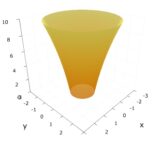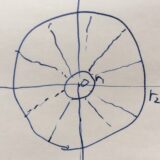どうも、木村(@kimu3_slime)です。
今回は、ラプラシアンが回転不変であることについて、2次元での証明を紹介します。
ラプラシアン(ラプラス作用素)とは、2次元の場合
\[ \begin{aligned}\Delta u = u_{xx}+u_{yy}\end{aligned} \]
と表される微分作用素です。\(\Delta u =0\)という方程式はラプラス方程式として知られています。
ここで、変数\(x,y\)を回転させた変数\(z,w\)について考えましょう。回転行列を使うと、角度\(\theta \)の回転による変数変換は
\[ \begin{aligned} \begin{pmatrix} z\\w \end{pmatrix} = \begin{pmatrix} \cos \theta & -\sin \theta \\ \sin \theta & \cos \theta\end{pmatrix} \begin{pmatrix}x \\y \end{pmatrix}\end{aligned} \]
と表せます。
ラプラシアンが回転不変(rotation invariant)であるとは、回転による変数変換をしても、\(u_{xx}+u_{yy}=u_{zz}+u_{ww}\)が\(u\)によらず常に成り立つことです。
では、ラプラシアンが回転不変であることを証明しましょう。回転変換は
\[ \begin{aligned} \begin{pmatrix} z\\w \end{pmatrix} = \begin{pmatrix} x\cos \theta -y\sin \theta \\ x\sin \theta +y \cos \theta\end{pmatrix} \end{aligned} \]
です。ここで合成関数の微分法則(チェインルール)を使えば、
\[ \begin{aligned}u_{x} = \frac{\partial u}{\partial z} \frac{\partial z}{\partial x}+ \frac{\partial u}{\partial w} \frac{\partial w}{\partial x} \\ =\cos \theta u_z+\sin \theta u_w\end{aligned} \]
\[ \begin{aligned}u_{y} = \frac{\partial u}{\partial z} \frac{\partial z}{\partial y}+\frac{\partial u}{\partial w} \frac{\partial w}{\partial y} \\ =-\sin \theta u_z+\cos \theta u_{w}\end{aligned} \]
となります。さらにこの法則を繰り返せば、
\[ \begin{aligned}u_{xx} \\ =\cos \theta (\cos \theta u_{zz}+\sin \theta u_{wz} )\\+\sin \theta (\cos \theta u_{zw} + \sin \theta u_{ww})\end{aligned} \]
\[ \begin{aligned}u_{yy} \\ =-\sin \theta (-\sin \theta u_{zz}+\cos \theta u_{wz} )\\+\cos \theta (-\sin \theta u_{zw} + \cos \theta u_{ww})\end{aligned} \]
となるので、
\[ \begin{aligned}u_{xx}+u_{yy}\\ = ((\cos \theta)^2 +(\sin \theta)^2)u_{zz}\\+((\cos \theta)^2 +(\sin \theta)^2)u_{ww} \\ +\sin \theta \cos \theta(u_{zw}+u_{wz}-u_{zw}-u_{wz})\\ =u_{zz}+u_{ww}\end{aligned} \]
と回転不変であることがわかりました。
ちなみに、3次元以上の一般の次元でも、ラプラシアンは回転不変\(\Delta u(Rx) = R(\Delta u (x))\)です。直交行列としての性質を用いて、成分計算で示せます。
参考:Laplace’s equation: properties – Viktor Grigoryan
また、変数の平行移動についても、ラプラシアンは不変です。回転不変かつ平行移動不変、すなわち合同不変な微分作用素と言うこともできます。逆に、合同不変な微分作用素としてラプラシアンを特徴づけられることも知られています。
以上、ラプラシアンが回転不変であることについて、2次元での証明を紹介してきました。
ラプラシアンが回転不変であることから、しばしばラプラス方程式では回転不変な解、すなわち球対称な(radially symmetric)解が見つかり、重要な役割を果たします。例えば円環領域におけるラプラス方程式の解\(\log r\)がそうです。
球対称解を考えるにあたり、ラプラシアンが回転不変であることは基本的な事実なので、証明を含めて知っておくと良いでしょう。
木村すらいむ(@kimu3_slime)でした。ではでは。
Pearson (2016-03-02T00:00:00.000Z)
¥4,910
Advanced Engineering Mathematics
John Wiley & Sons Inc (2011-05-03T00:00:01Z)
¥6,333 (中古品)
朝倉書店 (2002-01-01T00:00:01Z)
¥2,215 (中古品)
Partial Differential Equations (Graduate Studies in Mathematics)
Amer Mathematical Society (2010-04-02T00:00:01Z)
¥9,531 (中古品)
こちらもおすすめ
同軸円筒領域におけるポテンシャル:2次元ラプラス方程式の解き方






